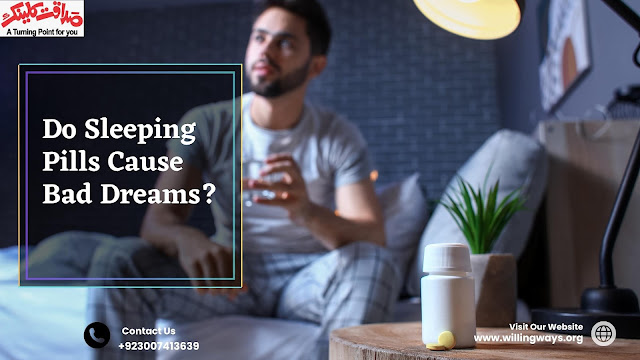Do Sleeping Pills Cause Bad Dreams?
Much is said and written about the importance of regular good at the best addiction treatment center in Karachi night's sleep for all modern people. Unfortunately, very few of us can say they benefit from high-quality and sufficient Sleep Disturbances Linked to Full Moon Cycles every night. As a result, most of us suffer from impaired immune system function, increased risks for various infectious diseases, chronic fatigue syndrome and headaches, inability to focus and maximize our performance at the workplace, and many other negative symptoms. A great night's Insomnia, the Most Common Sleep Problem, is a luxury for many of us. However, having regular restful sleep is something essential for our overall health. That is why we're trying to solve our sleep problems and treat our sleep disorders with such 'easy' solutions as sleeping pills. Though it is believed that sleeping pills can help us relieve our stress linked to insomnia and induce sleep, the quality of such sleep is not good, and it will not bring to usual positive effects we expect from good sleep.
According to the findings published recently in
the Journal of Cognitive Neuroscience, using sleeping pills can mess up our
emotional life and is linked to seeing bad dreams. The scientists from UC San
Diego conducted a series of experiments and analyzed the data they collected,
showing that using common over-the-counter sleeping pills is linked to
consolidating bad memories and seeing bad dreams. As underlined in the report
about the study, the findings are especially true for those who have chronic
insomnia and other sleep disorders linked to post-traumatic stress disorder,
excessive anxiety, and other related causes of sleep problems. Moreover, the
findings are also valid not only for the most popular over-the-counter sleep
aids but also for common prescription sleeping pills, including Zolpidem (
Ambien), which modern doctors very often recommend as an effective sleep aid.
The researchers focused their study on looking
closely at the phenomena known as "bursts of brain activity that last for
a second or less during a specific stage of sleep, "especially the
importance of those for our emotional memory. Previous studies have shown that
these bursts play a key role in selecting memories and other information from
our short-term memory and storing the selected information in our long-term
memory. This process takes place in the hippocampus, which is located in the
cerebral cortex of the brain. However, the current study has shown that using
Zolpidem and other sleeping pills interferes with the process making it
considerably more active. Therefore, the effects of sleeping pills on our
long-term memory can be used to treat patients with Alzheimer's disease and
other types of dementia like brain disorders, as well as those people who have
psychological disorders like schizophrenia, etc.
For the study, 28 volunteers, men and women
aged between 18 and 39, free from any possible sleep disorder, were invited. They were given Zolpidem and a
placebo, with intervals of a few days to allow the chemicals to evacuate from
the participants' systems. Both before going to sleep and after waking up, the
participants were shown some images which can evoke either positive or negative
emotions. As a result, it became apparent that those participants who were
given sleeping pills tended to remember negative images rather than positive
ones. The same can be said about images with arousing content: sleeping pills
tended to increase interest in that kind of image. One of the researchers who
was in charge of the study made the following observation: "I was
surprised by the specificity of the results, that the emotional memory
improvement was specifically for the negative and high-arousal memories, and
the ramifications of these results for people with anxiety disorders and PTSD."




Comments
Post a Comment